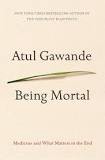Being Mortal: Medicine and What Matters in the End

Atul Gawande is an author of four books and a staff writer for The New Yorker in addition to being a surgeon and a public health researcher. Most people know him as the author of The Checklist Manifesto, which focuses on the use of checklists in daily and professional life. It’s amazing to see someone adept at and make a career out of more than one profession. In Dr. Gawande’s case, it’s three: writing, surgery and research. I was talking about Senior Care industry and the potential of solving problems in this space with a friend when this book got recommended to me. Since I’m already a fan of Dr. Gawande’s storytelling prowess, it went straight up to the top of my list.
In Being Mortal, Dr. Gawande takes a long hard look at how we can better take care of the elderly when they’re past their golden years, with inevitable frailty, illness and approaching death as the human body disintegrates one part at a time. “People with serious illness have priorities besides simply prolonging their lives,” he writes. “If your problem is fixable, we know just what to do. But if it’s not? The fact that we have had no adequate answers to this question is troubling and has caused callousness, inhumanity and extraordinary suffering.”
In the first part of the book, Dr. Gawande explores the various models of elderly care in place over the decades in various parts of the world. He starts off with the example of his great-grandfather who passed his final days in a multi-generational home in rural India, where respect for the elderly is a paramount value ingrained in the fabric of the society. In contrast, he talks about his grandmother-in-law in suburban United States, who lived all by herself well into her late 70’s till one day her children had to put her into a nursing home for the elderly against her wishes.
One of the most provocative and heart-breaking parts of the book describe an elderly home in a New Delhi slum, where beds were stacked next to each other like a “sheet of postal stamps” and an elderly man had to live there because his children had disowned him after he contracted a nervous disease rendering him partially paralyzed, while telling their families that he’d simply gone “missing”.
But all hope is not lost. Dr. Gawande discusses how the nursing homes for the elderly are evolving. He talks about newfangled nursing homes which brought in cats and dogs and kids to help re-instill purpose in the elderly, split up floors into smaller units that are more homelike and other models like Hospice that make aging-in-place more possible.
In the end, Dr. Gawande talks about how we need to reconsider our medical approach from “fix-at-all-costs” style life-extension, and examine what the quality of the extended life is. He writes, “the debate is about what mistakes we fear most — the mistake of prolonging suffering or the mistake of shortening valued life.” On the other hand, he critizes the Dutch practice of assisted suicide as “a measure of failure. Our ultimate goal, after all, is not a good death but a good life to the very end.”
Loneliness, acceptance, lack of purpose, and mere boredom are some of the biggest problems that the elderlies face, even if they’re lucky to live without any serious health complications — come to think of it, if you stop working in your 60’s, you still have about two decades to go before you die. Two decades is a very long time! While there are no ideal solutions to elderly care, this book will make you think long and hard on what being mortal really means, and that we have a long way to go before we reach more palatable solutions than the ones we have today.
Solving problems for the elderly with tech is one of the spaces where I think startups can make a dent. Here’s why: most founders are in the first four decades of their lives solving their own problems, so there’s very few people working in this space. In addition, the elderly have both the money and the desire to use anything that alleviates boredom and loneliness, or improves their general well-being.
This is #44 in a series of book reviews published weekly on this site.
